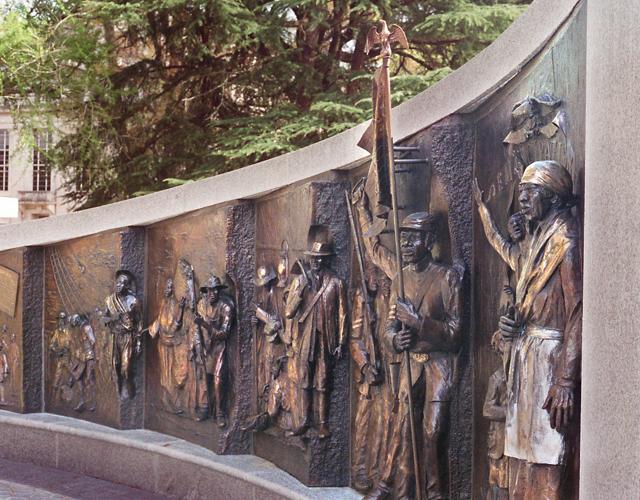A surprise shakeup at the S.C. African American Heritage Commission has raised concerns among some members over how two of their veteran colleagues were treated.
The ouster of founding commissioners Jannie Harriot and Michael Allen came without warning and without explanation, the two former members said.
Now, questions are being raised about the hierarchical nature of the S.C. Department of Archives and History and why its Archives and History Commission, whose members are mostly White, has oversight over the African American Heritage Commission, whose members are mostly Black.
The purpose of South Carolina’s commission is “to identify and promote the preservation of historic sites, structures, buildings, and culture of the African American experience in South Carolina, and to assist and enhance the efforts of the South Carolina Department of Archives and History,” according to a mission statement.
The African American Heritage Commission has 15 members from across the state who each serve three-year renewable terms. Each year, five members are appointed or reappointed. Since the commission was founded in 1993, its chairperson has recommended new appointees to the Department of Archives and History, which always has shown deference to those choices, according to the terms of a Memorandum of Agreement.
That changed this year.

Jannie Harriot, of the South Carolina African American Heritage Commission, joins her colleague Michael Allen, who received Order of the Palmetto recognition in 2019. Provided
Harriot and Allen, who are both Black, received letters dated Sept. 7 from A.V. Huff Jr., chairman of the Commission of Archives and History, notifying them that they would not be reappointed.
“The SC Commission of Archives and History met on Friday, September 3 to discuss appointments to the SC African American Heritage Commission (SCAAHC). Your appointment to the SCAAHC has expired. The members of the Commission of Archives and History would like to thank you for your service on the SCAAHC and for your efforts to preserve and promote South Carolina’s rich African American history,” it read.
Harriot said she had planned to serve one final three-year term before making way for younger people to join the commission. The letter came as a shock.
“This was done without any respect for the contributions we have made,” she said.
W. Eric Emerson, director of the Department of Archives and History, said the letters were pro forma, similar to other letters sent to civil servants when their terms are up.
What prompted the letters, he said, was an abundance of candidates for the African American Heritage Commission.
“In the past, there have not been multiple applicants for a limited number of positions,” he said. “There were more people wanting to serve than available positions.”
For the first time in memory, that triggered voting among the members of the oversight commission, Emerson said.
The African American Heritage Commission can advise department leaders or recommend certain candidates, but only the Archives and History Commission has the authority to make appointments, he said.
The vote took place a week before the African American Heritage Commission held its regular monthly meeting. When commission members learned of the changes, some expressed concerns, including around the language used in the letters.
“To call it terse would be a little too generous,” said Louis Venters, professor of history at Francis Marion University and a member of the commission. “If you are going to write a letter to Jannie Harriot and Michael Allen, for God’s sake you need to say a little more than that. These are old soldiers.”
Harriot has served as commission chairperson for nine years, vice-chairperson for six years and secretary for three years. She spearheaded numerous historical and educational projects and garnered a variety of accolades for her work.
Allen, a historian with the National Park Service for 37 years, has been involved in several South Carolina projects and organizations, including the Gullah Geechee Cultural Heritage Corridor.
Recent additions to the commission are African Americans.
History of the commission
In 1993, the S.C. Legislature passed a resolution creating the African American Heritage Council. But the resolution had an expiration date. In 2001, Gov. Jim Hodges issued an executive order creating a permanent commission. In 2006, the General Assembly codified it into law.
The commission is one of just a few similar government organizations around the country. North Carolina, Kentucky, and Maryland each have established African American heritage groups, and some municipalities have set up African American advisory councils.

The installation of historical markers, such as this one about the Briggs v. Elliott case, is part of the work done by the S.C. African American Heritage Commission. Provided
Harriot said she has been critical of a lack of diversity on the staff of the Department of Archives and History and its commission and has questioned some of the department's policies.
Bernard Powers, professor emeritus of African American history at the College of Charleston and director of the school’s Center for the Study of Slavery in Charleston, also questioned the lack of diversity within the department and the dismissal of two prominent activists.
“In a state with this history and this demography, that’s just a shame," he said. “If anything, someone like Jannie or someone like Michael ought to be on the Archives board. ... That would be an excellent way to recognize their service as well as to use the institutional knowledge they possess. It would be a good-faith gesture.”
Emerson said all the Archives and History Commission can do is call for more diversity; it does not have the authority to appoint its own members. Those appointments come from the governor, the South Carolina Historical Association, the South Carolina Historical Society, the University South Caroliniana Society, and various state universities.
“When you’re attempting to diversify the (Archives and History) Commission, to a great extent it’s out of the commission’s hands,” he said.
State Rep. JA Moore, D-North Charleston, said he was troubled by the treatment of Harriot and Allen and by the way the commissions are structured.
“We’re working on legislation as we speak to fix this,” he said. “It should not be two separate, segregated commissions. South Carolina history is African American history and African American history is South Carolina history.”
Moore said he is reaching out to the Department of Archives and History to discuss commission appointments and “to right this wrong.”
Examining the structure
Venters, who is White, said the current structure of the Department of Archives and History encouraged a bifurcated view of history.
“Who conceived of the fact that you should have an official Archives and History Commission that then has power to appoint a subsidiary African American Heritage Commission?” he said.
The current organizational structure is a manifestation of White dominance, and it suggests that Black history is secondary, he said.
The reason the Black commission exists is to excavate and vindicate South Carolina’s Black history, work that otherwise would not get done, Venters said. That work should be part of a comprehensive approach sponsored by the state and spearheaded by African American Heritage Commission members “because they know how to do it, and they do it right,” he said.
Victoria Smalls, director of the Gullah Geechee Cultural Heritage Corridor and a member of the African American Heritage Commission, said she and her colleagues are owed an explanation for the decision to let Harriot and Allen go.
She said commissioners hope to retain Harriot as a volunteer consultant “because of her vast institutional memory, connections and networking.”
The state will recognize Harriot and Allen on Oct. 21, when each will receive a 2021 Governor’s Award in the Humanities for their commitment to community activism and cultural preservation.















